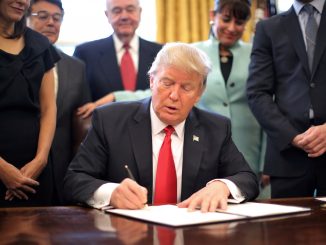

Earlier this month, Gov. Roy Cooper appeared on national cable news touting how he closed North Carolina bars to fight the spread of COVID-19. The problem is most bars in North Carolina are open — Cooper has singled out only one small class of bars that have remained closed. Even under Cooper’s executive order implementing a nightly curfew, North Carolinians can enjoy a beer with wings at a nearby restaurant, enjoy cocktails at a distillery, or visit tasting rooms at wineries alongside tourists from other states.
But you can’t enjoy a beer or mixed drink at what’s known as a “private bar” in North Carolina. A private bar is a classification under the state alcohol laws that essentially amounts to a bar without a kitchen indoors. Cooper has kept most private bars closed since March 17, 2020 — while restaurants, breweries, distilleries and wineries have been permitted to open and sell alcohol to customers both inside and outside since the end of May.
My client Crystal Waldron and her husband Rob have owned and operated Club 519, a private bar in Uptown Greenville, for 18 years. It is their primary source of income. But thanks to the governor’s discriminatory mandates, they are on the verge of closing for good. Last week, we asked a North Carolina Court to intervene and put an end to the governor’s unequal treatment of private bars.
Under the Phase 3 Orders, Cooper permitted private bars to open at 30 percent occupancy outside only, or no more than seven customers for every 1,000 square feet of outdoor space. Just in time for the cold weather, Cooper’s show of mercy is an empty gesture. As Zach Medford, owner of a private bar in Raleigh has noted, even if a private bar had outdoor space the size of an NCAA basketball court, it could only serve 33 customers under the draconian restrictions placed on private bars. Most private bars do not have basketball court-sized outdoor spaces and are limited to much smaller capacity limits.
Many private bars, like Club 519, do not have any outdoor space for customers at all. So for almost nine months, Club 519 has been forced to close. Meanwhile, bars in restaurants, breweries, distilleries, and wineries continue to serve customers indoors and outside at 50 percent capacity.
This discriminatory treatment of private bars is part of the governor’s so-called “dimmer switch” approach. You see, the state has invested significant resources to help attract and develop breweries and wineries, including providing loans and incentives to attract these businesses to North Carolina.
And ironically, while the governor has asked North Carolinians not to travel for Thanksgiving and Christmas holidays, he’s pointed to the tourism and spending that breweries and wineries attract to justify his decision to keep them open while forcing private bars to close. The governor’s orders aren’t tough on the pandemic — but they’re incredibly tough on small business.
And that’s not the only problem with the governor’s one-man rule. Despite what Cooper might have us believe, the governor cannot single-handedly dictate the state’s policy response to COVID-19. Under our state constitution, the executive power is distributed among the governor and the Council of State. But no executive, including our governor, can create laws. The people of North Carolina granted legislative authority to their representatives in the General Assembly. It’s the legislature’s duty to weigh trade-offs and craft a policy response to COVID-19.
Nearly six months ago, the General Assembly tried to do just that. They presented a bill to re-open private bars under new health and safety restrictions and two bills that would reign in the governor’s use of emergency mandates — but Cooper vetoed all three bills.
There is no doubt COVID-19 poses serious health risks and requires a public health response. But that fact does not empower the governor to declare a state of emergency for an unlimited duration and turn our system of constitutional government on its head. Empowered by the state of emergency, the governor has arbitrarily picked economic winners and losers. For the unlucky and forgotten like Crystal Waldron and Club 519, their only recourse is in the courts.
That’s why Pacific Legal Foundation is representing Crystal and Club 519, free of charge, vindicating her right to enjoy the fruits of her labor and equal protection of the law.
Jessica Thompson is an attorney at Pacific Legal Foundation, which litigates nationwide to achieve court victories enforcing the Constitution’s guarantee of individual liberty.



